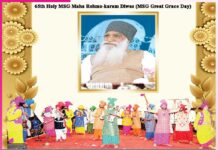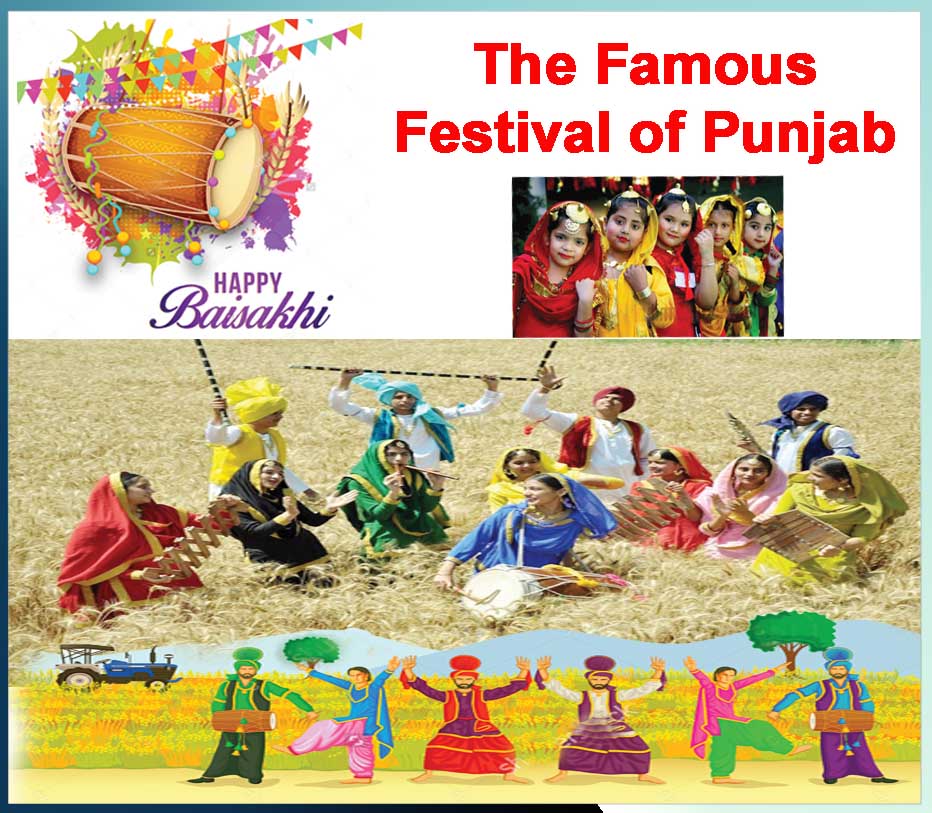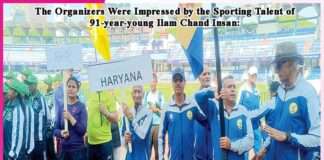The Famous Festival of Punjab – Baisakhi If India is called a pit of festivals, this is not an exaggeration. Despite living in the shadow of the scarcity, religious tendencies burst in the vast majority of the people here.
Table of Contents
This bloom is in the form of various festivals.
The Baisakhi festival is also the traditional joy of the country full of wave and passion and messenger of brotherhood and unity. This festival boasts both aspects of happiness and pain within itself. ‘Baisakhi’ is a famous festival of India and it is celebrated especially in Punjab with glee and fervour. There is a huge fair in Punjab on this day. The shade of this day is just worth seeing. When the entire Punjab becomes drenched in happiness, fairs and festivals, all the members of every family engage in dancing and singing and wear new and brightly colored clothes.
Also Read:
Farmers get frustrated in their fields on the demolition of the trash and dholak. Seeing their golden crops fluttering, they say, ‘O Jatta, Aai Baisakhi’ and this voice emerges in the fields and barn and in every street of the villages. India is an agriculture-based country. In our village, Baisakhi festival has been associated with the cultivation and harvesting of rabi crops. Rabi crop rises on this festival. Therefore, it is also considered as a symbol of economic prosperity.
Although the festival of Baisakhi has been considered as the main festival of Punjab, this festival is celebrated not only in Punjab but in almost all the places across the country, especially by the Punjabi community, on 13th of April every year with great pomp and euphoria. The roasting fields spell the farmers with crops grown on the Baisakhi festival. In the fields, there is a lot of enthusiasm. On some places People are cutting the gram of some crops and now the fields and barns are seen littered with mustard seeds. The golden aura of wheat attracts everyone’s heart. Shedding a gold sheet, the form of earth transmits energy to everyone.
This same energy produces enthusiasm among the farmers. They begin to take a new Passion, New embarrassment and new wave. Food-food grain are stacked in the courtyard of the houses. Every aspect of prosperity and happiness begins to appear.
Apart from cultural and historical references, Baisakhi festival also has a deep connection with the country’s freedom struggle. The day of Baisakhi on April 13, 1919 still screams about the British oppressors. Actually thousands of people gathered at Jallianwala Bagh, which is in Amritsar, on the call of president of Congress Mahatma Gandhi to raise his voice in protest against the ‘Rowlatt Act’, because under that act, the judges and the police officers were given right to put any Indian in the prison without any reason and without any trial.
This was the reason that on the call of Mahatma Gandhi, there was tremendous resentment against the law in the Indians, and in protest against it, there was a huge public meeting of thousands of people in Jallianwala Bagh of Sri Amritsar Sahib. But the British government, by creating a very dangerous conspiracy, surrounded the people gathered in Jallianwala Bagh and started to launch sudden indiscriminate firing without any previous warning. Hundreds of innocents and unarmed Indians were martyred in this bloody massacre.
Baisakhi is celebrated in different races of the country by the different names:
Pona Sankranti
Oriya society celebrates the day of Baisakhi in the name of Sankranti. On this day,a special dish is made of yogurt and jaggery. Also, rice molasses have special significant role in the recipes to be made here. Brinjal, banana, potato, pumpkin-pot is made and on this day, also pray to god for happiness and prosperity with rain all year round.
Bengal’s New Year
The new year of Bengal starts from the first day of the month of Baisakhi.
Here, this day is known as ‘Shubho Nabo Borso’. From this day, Crop harvesting starts in Bengal. People here start doing new work on this day onward. Women make a dish from the new crop of paddy coming home this day.
Vishu in Kerala
In the southern Indian state of Kerala, the work of sowing of paddy starts on this day.
This day is called ‘Malayali New Year Vishu’. Hull and oxen are decorated with colors and also gifts are given to children.
In Assam Bihu and Puthandhu in Tamil Nadu
People of Assam celebrate this day,as New Year day ‘Bihu’. Public celebration is celebrated with folk dance on the occasion of Bihu. People of Tamil Nadu celebrate new year on the same day and celebrate this day as ‘Puthandhu parv’.
Navareh in Kashmir
According to the Saptisms mentioned in the scriptures in Kashmir, this day is celebrated as the name of Navareh, in the form of New Year’s Festival. On this day, people here greet to each other and meet each other with glad and joy.
Beginning of the era
Andhra Pradesh is also an agricultural area. That is why this day have special significance for the farmers. It is celebrated as the beginning date of the era.
New year of Maharashtra
In Maharashtra, this day is celebrated with the joy of celebrating the day of creation. According to the belief, the time began to move from this day. Here, this festival is celebrated with full joy, on the occasion of the New Year, by making Srikhand and poori. This day, food and donations are also given to the poor people and children wear new clothes in the homes.
In this way, this festival is celebrated in every nook and corner in India in different ways. Seasons like Baisakhi collaborate in keeping India’s culture intact. This festival helps to keep Indians in the form of unity, brotherhood and progress. Though Baisakhi is not a regional festival of India, yet it is celebrated everywhere in different ways in the whole of the country. – Vaishali Raj
Follow us on Facebook, Twitter, LinkedIn, Instagram and YouTube to get more updates related to Sachi Shiksha – The Famous Spiritual Magazine in India.













































